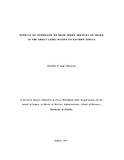| dc.description.abstract | Water transport is considered to be the cheapest mode of transport in the world. The Great Lakes Region of Eastern Africa is endowed with large water masses that, if properly harnessed and utilized, can play a facilitative role in enhancing inter-state trade within the region. The main lakes include Victoria, Albert, Kivu, Kyoga, Tanganyika and Malawi. Rivers Nile and Kagera are also navigable to a certain extent.The British and Belgian colonial masters played their roles in pioneering the survey and launch of lake steamers and ships in these water masses but the emerging independent African states have only succeeded in running down the facilities.The existence of the Lake Victoria Marine Services (Train Ferry transport) dates back to the late 19th century when the then Uganda Railways reached the lake head at Kisumu. The IBEA Company that was then administering the territory where the railway passed launched steamers on the lake at Kisumu, with the first boat being commissioned in 1903. The services continued to expand and by the early 1960s, the lake transport network was well developed.
The services formed an important link to the rail which had up to early 1930s not been
extended to Uganda. Goods arriving by trains connected directly to the ships, on to the
destination. With the construction of the central line in Tanganyika by the Germans, the marine services formedan efficient intermodal interchange from rail to lake and then to road and viceversa.
In this way, the services contributed to an increase in trade, employment and reduction
in poverty. This is the service that was suspended by the new private company that took over the running of Kenya and Uganda Railway networks.The objectives of this study were to inquire into the importance of the Train Ferry services on trade in the Great Lakes Region of Eastern Africa and the effects of its suspension on this trade. The study employed the case study method. Interviewees from five major companies that used the ferry services prior to its suspension were interviewed using an interview guide. Their responses were recorded and the contents of the data collected analyzed for consistency. This has been presented using percentages, mean scores and line graphs.The research findings of the study are that the suspension of the Train Ferry services had a great impact on all the companies involved in the study. The main and most immediate effect was a lack of a cheaper, reliable, predictable and dependable means of transporting their goods across the region. They faced longer routes and
increased cost of transport. They were, however, able to adjust quickly to the situation by
looking for other, albeit more costly and less efficient, means of transport to ensure that the goods reached the market. The companies viewed the ferry services as very important and prayed for their re-instatement.Among the areas suggested for improvement by the interviewees was managerial support. The respondents were unanimous that there was a lack of such support in the past. They wished that in the event of re-instatement, this particular issue would be given prominence. The respondents also felt that it was important for the link between the rail and the lake to be made seamless to avoid situations where goods were held at the interchange point inordinately awaiting trains and or ferry connections. The respondents further emphasized the need to ensure that both the ferries and trains were technically sound to
ensure an even more efficient service. Other suggestions were to lower the transportation rates which the respondents felt were unreasonably high, and to introduce vessels of various sizes that would cater for small, medium and large customers. | en |

